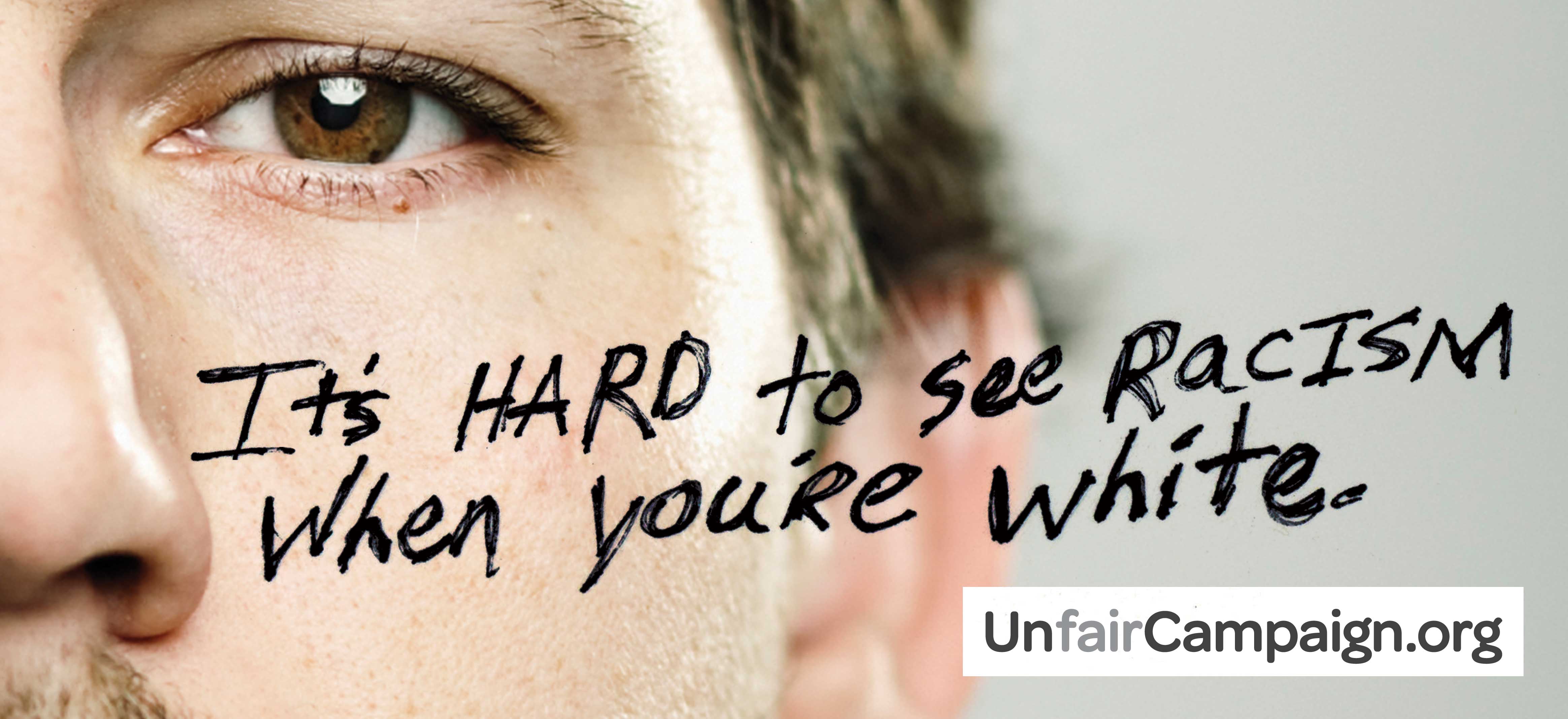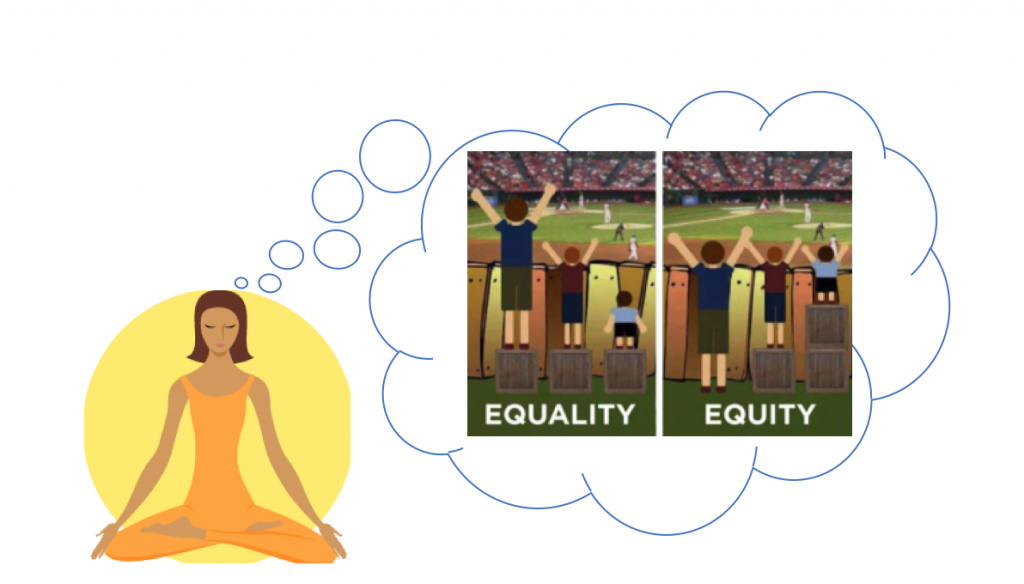Equity and Equity Training
Equity is the awareness that simple equality does not lead to equitable results, since we are all different and have different needs.

Equality to a conservative/to a liberal, by Froehle C., 2012 (adapted) https://plus.google.com/+CraigFroehle/posts/AdKcNKesXwa. Public Domain
Watch the following video that explains this difference between equality and equity:
Equity training (also diversity, anti-oppression training) refers to teaching a three-fold form of awareness:
- The different sources of privilege and disadvantage that mainstream culture perpetuates (including implicit bias)
- People’s own complex social locations
- How to engage in a constant self-reflective effort to work towards equity in our everyday interactions amid diversity
Why is equity training needed?
Society and mainstream culture constantly sway us, our view of the world, and how we see one another. We absorb dominant ideas, beliefs, aspirations, desires and make them ours:
- We carry them in our bodies, in how we move and in how we present ourselves to the world
- This is not necessarily a positive influence, and it can be systemic. Here is a video of one example:
- We are all brought up in specific cultural/social environments that condition our perceptions of one another
- Nobody is exempt of prejudice and biases, we identify people by race, gender, colour, origin, ability, wealth, religion… even age, size, accent, or perceived beauty to name a few markers
Equity Work
Is a “labour of love,” it entails an everyday effort to building a fair, egalitarian, and inclusive community around us.
Privilege and Disadvantage
Privilege produces BLIND SPOTS: we cannot see our own bias and we think that we deserve our station in life.

http://unfaircampaign.org/press-room/media-kit/
While this may be the case to an extent (what we achieve involves hard work!), some individuals have more privilege than others because we tend to favor people who belong to our own group and who are not seen as belonging to minorities.
Racism was created by colonial ideas of white superiority; sexism, by long entrenched ideas of male superiority; homophobia, by long established ideas of what a couple should look like; ableism, by our ideas of what is seen as ‘normal’ bodies… and so on…
To help you explore this further, please click on the link for clear illustrations of these types of privilege:
We may have privilege of some form or another; by luck of birth, we may be placed in a system that creates suffering; we may not deserve everything we have…
Becoming aware of this, may produce discomfort in us and may make us feel guilty, or disheartened, or angry.
People with archetypal privileged identities (such as white males) may experience negative feelings when presented with this kind of evidence; especially when their individual life-stories may have made them feel less than privileged.
On the flip-side, disadvantaged minorities may not want to be labeled “disadvantaged.”
Nevertheless, equity work must recognize that the “playing field” is not level at all; that our differences matter in order to get acceptance, recognition and opportunities from mainstream society.
Reflecting on our own privilege in an inequitable world is essential.
But once we know about our own privilege, once we have an awareness of the source of our privilege (often invisible), we ought to own this awareness AND DROP THE GUILT
This online workshop is designed to help you get close to this objective; we hope it will help you become an equity worker, engage in this “labour of love,” and live your everyday life through the lens of this awareness.

Meditating Buddhist, by qubodup, 2012, https://openclipart.org/detail/172675/meditating-buddhist
Definition
Relating to one’s experience within an orientation of curiosity, experiential openness, and acceptance. Gaining insight into our own mental, emotional, and bodily states. De-centering one-self, seeing one’s own thoughts and feelings as relative and temporary.
Workshop Exercise: “Mindfulness Inventory”
This exercise will help you to think about your own states of mind and heart, it will make you aware of whether you need to develop more mindfulness in your everyday life (which is good for your mental and physical health as well as for sustaining an equitable and fair community around you).
- Download the mindfulness inventory here (pdf).
- Mark an ‘X’ in one of the four alternatives describing the frequency of experiences of mindfulness
- Characterize your most recent experience of connection to the present moment
- Think about the last 2 days as the time-frame to consider each item in this inventory
- There are no ‘right,’ ‘wrong,’ ‘good,’ or ‘bad’ responses; what is important is to be aware of your own personal experience
Workshop Exercise: Mindful Meditation
Sit in an upright position resting your hands on your lap, making contact on the floor with your feet. Now play the following five minute guided meditation (or see other mindful meditation guides below). This will allow you to become self-aware and fully present in your body, thoughts, feelings and emotions.

Vicious-Speed, Open Clipart
Make sure you complete at least this mindful meditation!
It will help you to be ready to acquire the awareness necessary to engage in equity work.
Other mindful guided meditations:
http://marc.ucla.edu/mindful-meditations
Workshop Exercise: “Being aware of our emotions”
Take a couple of minutes to read the list of emotions in this inventory (pdf).
Next watch the slide-show of pictures that follows and record any feelings each picture may evoke in you, notice if a picture makes you feel uncomfortable or if it gives you “happy” feelings.
[pdf-embedder url=”http://droptheguilt.trubox.ca/wp-content/uploads/sites/316/2017/05/Picture-slide-show.pdf” title=”Picture slide show”]
Throughout the exercise try to keep an awareness of your emotions in relation to yourself and to others around you.
